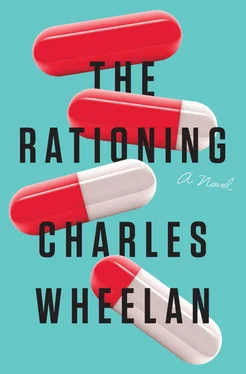SPRING WAS IN THE AIR ON THE DARTMOUTH CAMPUS, IF not necessarily visible. The trees were bare, and the grass was still brown, but the weather was unseasonably warm. This was “mud season” in New England, when the snowmelt and new rain made a mess of things before the trees and flowers finally caught up with the rest of the country. The day was sunny and the few students walking across the green opposite the hotel were dressed more for July than for April; I suppose that is part of the optimism of spring, having just emerged from a New England winter. Much to my surprise, there was a New York Times box just outside the hotel in the same place it had been when I was a student, perhaps for the old alums who liked the sensation of reading a real newspaper. I paused to peruse the headlines, noting with amusement that some members of Congress were calling for hearings to examine whether the President had passed classified information to his Colombian mistress.
I had been to Huke’s house once before, when he invited our senior seminar to his home for dinner. It was not far from campus, about five or six blocks up a hill leading out of town. The day was perfect for walking. I let my mind wander as I went, trying to formulate questions to steer the conversation. I turned down a narrow street with small, well-kept houses relatively close together. There was no sidewalk but also no traffic, so I walked in the middle of the road. As I approached Huke’s house, he emerged from the side yard pushing a small wheelbarrow. He waved hello and hustled over to greet me. “Isn’t it too early to plant?” I asked as he approached.
“Oh, yes,” he said jauntily. “Nothing goes in the ground until Mother’s Day, but it’s never too early to start cleaning up. We don’t get many days like this in April.”
Huke’s house was a small ranch with a sunroom in the back. I had spent so much time in “McMansions”—soaring foyers and enormous great rooms—that Huke’s house seemed quaint by comparison. Yet it was so comfortable and tidy that I found myself wondering why anyone would want anything bigger, especially if one could just stroll to work in the morning. I was reminded of Sloan’s comment long ago about the “academic lifestyle.” I paused near a set of bookshelves, perusing the eclectic titles. “You can have anything you want,” Huke offered. “I have boxes more in the basement. I had to clean out my office when I retired.”
We sat at a small table in front of a window looking out at the woods behind the house. Professor Huke’s wife brought us tea and croissants. “They’re from King Arthur Flour,” she offered. It was a little café across the river in Vermont, where I used to go to work when I was a student.
“So, you have a virus puzzle, have you?” Huke asked. He nodded as I explained what we had learned about this lurking virus: the numbers, the regions affected, the dust mite vector, the bizarre pattern of cases that turned virulent. “Very exciting!” he said, slapping his knee. I had not told him about the Dormigen shortage, or the twelve hundred people who had died so far, or the marathon meetings at the White House, or the looming decision about the South China Sea Agreement—so of course he would think Capellaviridae was exciting. I found his scientific exuberance refreshing despite the circumstances.
“And you’re certain that you’re not dealing with a mutation?” he asked.
“We’ve sequenced the virus when it’s benign, and we’ve sequenced the virus when it turns virulent—identical DNA.”
“The vector, the dust mite, that’s a subspecies?” he asked. I nodded yes and Huke continued, “You do have a puzzle on your hands.” There was a pause as Huke sipped his tea, and then stared out at the woods behind the house. Eventually he said, “If this were a midterm, what would I ask?”
I felt a pang of annoyance at the pedantic nature of the question. I was tempted to point out how far this was from an academic exercise. “It’s been a long time since I’ve taken an exam,” I demurred.
“My classes were always about viruses, not people,” he said. “Sure, humans were often the hosts, but viruses were the stars. So, what I would ask you on a midterm is: ‘What’s in it for the virus?’ Right? Viruses exist to propagate themselves, as do other species—like this dust mite, so I might look there, too. What’s in it for them? How is this a successful evolutionary strategy?”
“That seems to be the mystery with all lurking viruses,” I answered. “Why would you kill your host when you’ve got a perfectly good thing going? The lurking viruses seem to turn evolution on its head.” Huke made eye contact, acknowledging my point. I continued, having found what felt was a perfect metaphor: “It’s like you’re living free in someone’s house. They do your laundry. They cook your meals. And then one day you get up and kill the owner of the house. It makes no sense.”
“I agree. That’s not how nature works,” Huke said firmly. “We’re missing something.” He was growing excited and he slapped his leg again. “I envy you!”
I laughed. “It’s been a lot of work, to be honest.”
“ Capellaviridae kills its host some of the time, but not usually,” Huke mused. “That’s a clue.”
“Yes.”
“One of the species involved has to benefit from this strange arrangement,” Huke prodded. “Maybe it’s Capellaviridae , maybe it’s this dust mite. Something here has to help one of them reproduce more successfully in the long run. Start with first principles, right?”
“What if that’s not what’s happening?” I asked.
“Then you have no hope,” he said with a laugh. “It’s like solving a murder with no motive. You have no idea where to begin looking. But that’s not usually the case, is it? Always start with the jealous boyfriend!”
We chatted amiably for a while longer before I excused myself. “I’m off to physical therapy,” Huke said. “My shoulder. Last year it was my knee. That’s what happens when you get old.” He walked with me to the front door and then out into the front yard. The sun was higher and the day had continued to warm up. “Not bad for April,” Huke said. I offered thanks and promised to pass along whatever I learned. His excitement was still palpable.
I turned and walked self-consciously across the damp front lawn toward the road, my dress shoes sinking into the grass. Just as I reached the asphalt road, Huke said loudly, “Wait a minute. One more question.” I turned and took a few steps back toward him. “The dust mite, it bites, yes?”
“That’s right,” I said.
“Most dust mites don’t bite.”
“Correct.”
“So what happens if you get bit by this particular dust mite, other than the virus?” he asked.
“We’ve been focusing on the virus,” I said.
“Does it itch?” Huke asked.
“The dust-mite bite?”
“Yes.”
“I don’t know,” I admitted.
“For goodness’ sakes, find out!” Huke advised. “Because if this dust mite is a real pest, humans will try to get rid of it. And when that happens, nature always fights back!”
I thought about Huke’s parting comment as I walked back to the Hanover Inn. A taxi was waiting for me; the bellman had already put my duffel in the trunk. As soon as I got in the backseat, I called Tie Guy on his cell phone. “I have a different angle,” I said without exchanging pleasantries. “This dust mite: How do you get rid of it?”
“It’s too late for that,” he said. “People are already infected—”
“No, no, no,” I said. “I just want to know what people have been doing to try to get rid of the dust mite.”
Читать дальше












